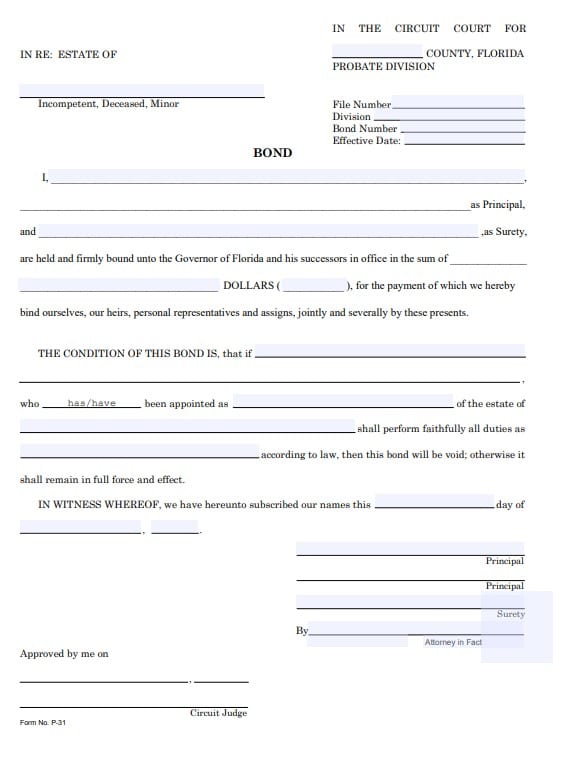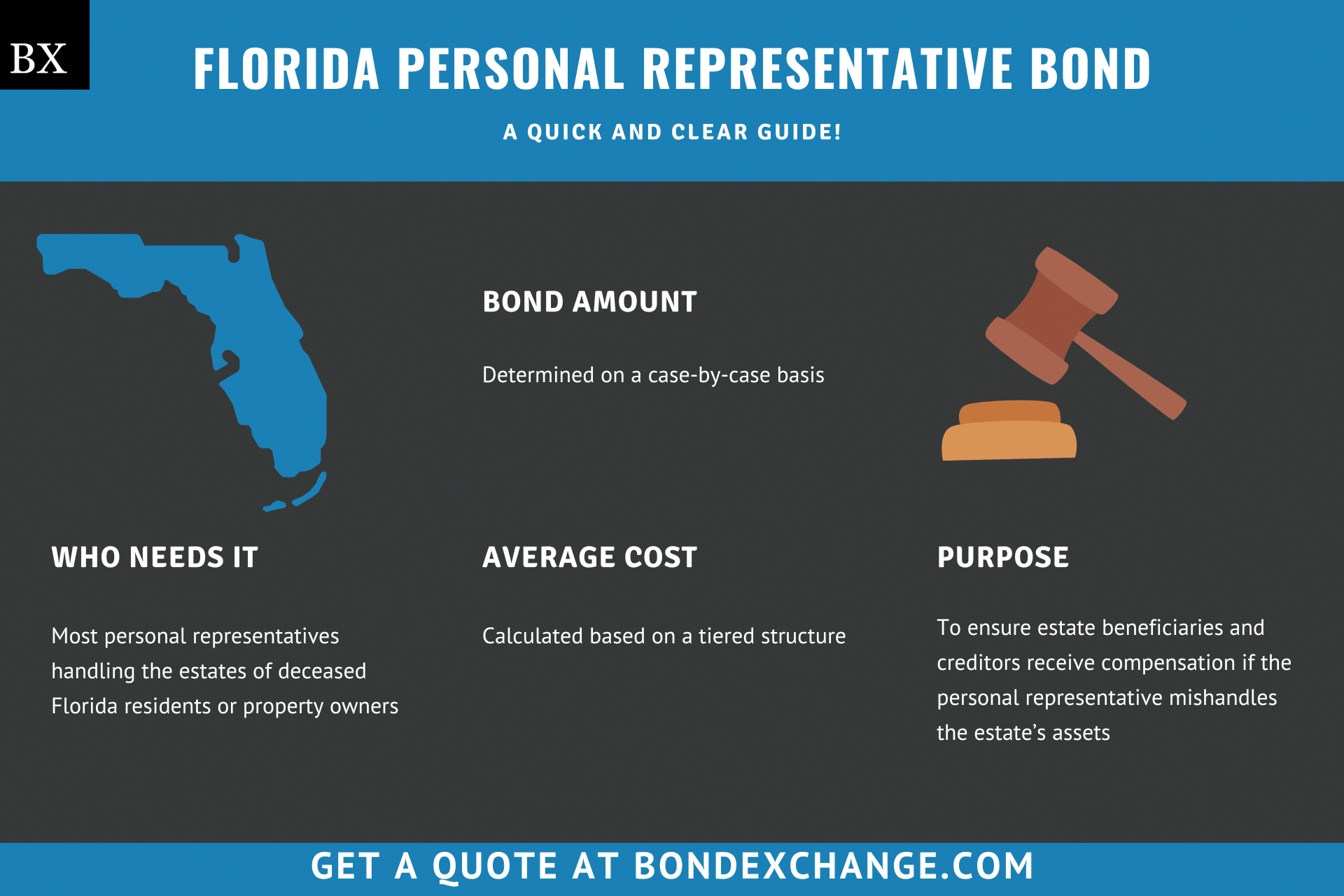Florida Personal Representative Bond: A Comprehensive Guide
This guide provides information for insurance agents to help their customers obtain a Florida Personal Representative bond.
At a Glance:
- Average Cost: Calculated based on a tiered structure
- Bond Amount: Determined on a case-by-case basis (more on this later)
- Who Needs it: Most personal representatives handling the estates of deceased Florida residents or property owners
- Purpose: To ensure estate beneficiaries and creditors receive compensation if the personal representative mishandles the estate’s assets
- Who Regulates Personal Representatives in Florida: The circuit court with jurisdiction over where the deceased individual resided or had property

Background
Florida Statute 733.601 requires all personal representatives of an estate to be appointed by a court before assuming their fiduciary duties. The Florida legislature enacted the appointment requirement to ensure that personal representatives do not mismanage the estate’s assets. To provide financial security for the enforcement of this requirement, the court may require the personal representative to purchase a probate surety bond to be eligible for appointment.
What is the Purpose of the Florida Personal Representative Bond?
Florida requires personal representatives to purchase a surety bond as a prerequisite to being appointed as a fiduciary over an estate’s assets. The bond ensures that the estate’s beneficiaries and creditors will receive compensation for financial harm if the personal representative fails to abide by the regulations outlined in Florida Statute 733-402. Specifically, the bond protects beneficiaries and creditors if the personal representative engages in acts of fraud or mismanages the estate’s assets. In short, the bond is a type of insurance that protects the estate’s beneficiaries and creditors if the personal representative violates their fiduciary duties.
How Can an Insurance Agent Obtain a Florida Personal Representative Surety Bond?
BondExchange makes obtaining a Florida Personal Representative bond easy. Simply login to your account and use our keyword search to find the “Probate” bond in our database. Don’t have a login? Gain access now and let us help you satisfy your customers’ needs. Our friendly underwriting staff is available by phone (800) 438-1162, email or chat from 7:30 AM to 7:00 PM EST to assist you.
At BondExchange, our 40 years of experience, leading technology, and access to markets ensures that we have the knowledge and resources to provide your clients with fast and friendly service whether obtaining quotes or issuing bonds.
Not an agent? Then let us pair you with one!

Click the above image to find a BX Agent near you
How is the Bond Amount Determined?
Florida Statute 733.403 grants the court authority to determine the bond amount on a case-by-case basis. However, the court must consider the following factors when making their determination:
- The gross value of the estate
- The relationship between the personal representative and estate beneficiaries
- Exempt property and any family allowance
- The type and nature of the estate’s assets
- Known creditors
- Liens and encumbrances on the assets
Any interested person may petition the court to increase or reduce the required bond amount.
What are the Underwriting Requirements for the Florida Personal Representative Bond?
Most surety companies will examine the following factors when determining eligibility for the Florida Personal Representative bond:
- Personal representative’s credit history (not considered for bonds with limits less than $25,000)
- Whether or not the estate has an attorney (not considered for bonds with limits less than $25,000)
- How long the fiduciary appointment is for
- Whether or not the personal representative is replacing a prior fiduciary
- If the personal representative has ever committed a felony
- If there are disputes among the estate’s beneficiaries
- Whether or not there is any ongoing business in the estate
- If the bond is being required by a creditor
How Much Does the Florida Personal Representative Bond Cost?
Surety companies typically determine the premium rate for personal representative bonds based on a tiered structure. As a result, larger bond amounts will be charged a lower premium rate than smaller bonds.
The following table illustrates the pricing structure for the Florida Personal Representative bond:
$1,500,000 Personal Representative Bond Cost
| Bond Amount | Premium Rate | Total Bond Cost |
|---|---|---|
| First $20,000 | 0.75% | $150 |
| Next $40,000 | 0.60% | $240 |
| Next $140,000 | 0.50% | $700 |
| Next $300,000 | 0.375% | $1,125 |
| Next $1,000,000 | 0.25% | $2,500 |
| Total cost of $4,715 |
Who is Required to Purchase the Florida Personal Representative Bond?
Florida requires personal representatives to purchase a surety bond as a prerequisite to obtaining a fiduciary appointment. To paraphrase Florida Statute 731.201, a personal representative is a court-appointed fiduciary responsible for administering a deceased individual’s estate. Personal representatives are referred to as executors if the deceased individual nominated them in their will, or administrators if they were not nominated in the will or if no will exists.
Personal representatives are not required to purchase a bond if:
- The will explicitly waives the bond requirement
- They are a bank or trust company
- The court determines that the bond is unnecessary
Any interested person may petition the court to require an exempt personal representative to purchase a bond.

How do Personal Representatives Become Appointed in Florida?
Personal representatives in Florida must navigate several steps to become court-appointed fiduciaries. Below are the general guidelines, but applicants should refer to Florida’s probate statutes for details on the process.
Step 1 – Meet the Qualifications
No person may be appointed as a personal representative that:
-
- Has been convicted of a felony
- Has been convicted of the abuse, neglect, or exploitation of an elderly person
- Is deemed mentally or physically incapable of performing their duties
- Is under the age of 18
Step 2 – Determine Priority
Priority to serve as a personal representative shall be granted in the following order:
Testate Estates (Died with a Valid Will)
-
- Persons nominated in the will
- Persons nominated by a majority of beneficiaries
- Any person entitled to receive the real property of the estate
In Intestate Estates (Died Without a Valid Will)
-
- The surviving spouse
- Persons nominated by a majority of the heirs
- The heir nearest in degree to the deceased individual
For both testate and intestate estates, if no person with priority seeks an appointment the court may appoint any qualified person, provided that they do not work for the court or hold public office under the court or any other judge exercising probate jurisdiction.
Step 3 – Hire an Attorney
Although not explicitly required, it is highly recommended that personal representatives hire an attorney to assist with the probate process.
Step 4 – Contact the Court
Personal representatives must contact the circuit court with jurisdiction over the deceased individual’s estate. A representative of the court will walk the personal representative through the appointment process, provide them with all required forms, and answer any questions they may have.
Interested persons that object to the personal representative’s appointment, the validity of the will, or the venue the will is being probated have three months from when they received a notice of administration to file an objection with the court.
Step 5 – Purchase a Surety Bond
Unless otherwise exempt, personal representatives must purchase and maintain a surety bond (limits outlined above).
How do Florida Personal Representatives File Their Bonds?
Personal representatives should submit their completed bond forms, including the power of attorney, to the circuit court with jurisdiction over the estate.
The surety bond requires signatures from the company that issues the bond and the personal representative. The surety company should include the following information on the bond form:
- Court where the bond is to be filed
- Name of deceased individual
- Legal name of the entity/individual(s) buying the bond
- Surety company’s name
- Bond amount
- Date the bond is signed
What can Florida Personal Representatives do to Avoid Claims Made Against Their Bonds?
To avoid claims against their bonds, personal representatives in Florida must ensure that they:
- Do not engage in any acts of fraud
- Do not mismanage the estate’s assets
- Fulfill their fiduciary duties
